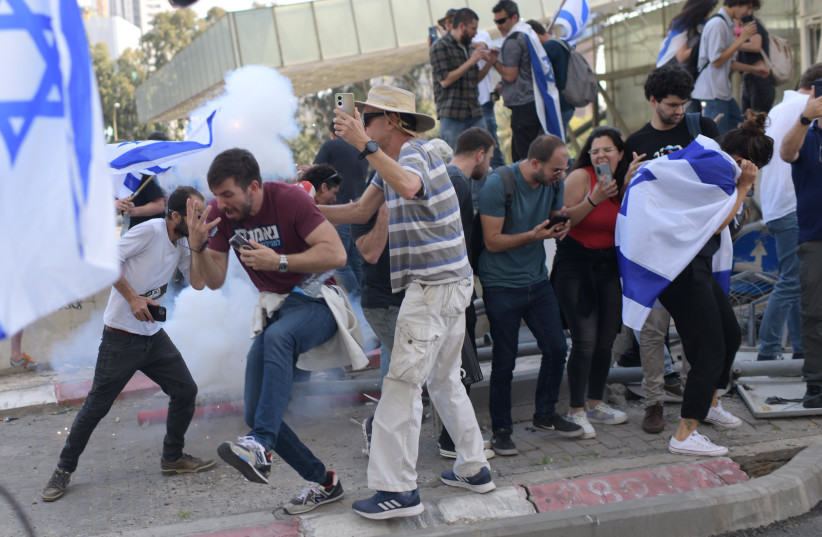A police officer who threw a stun grenade at protesters at a judicial reform demonstration in Tel Aviv on Wednesday will be subject to a probe by the Police Internal Investigation Division, following complaints by an NGO on Thursday.
The Movement for Moral Purity had submitted a complaint to the internal investigation contending that commissioner Meir Suisa, who had been caught on video, had used excessive force when he threw a stun grenade in violation of police procedures.
According to police procedures, use of such munitions needs to take into consideration the environment and terrain, and there must be a distance of at least one meter between detonations and suspects, said the movement.
A protester was injured
A protester may have been hit and hurt by the stun grenade, said the movement. A source present at the demonstration had previously told The Jerusalem Post on Wednesday that a man had been struck on the side of his head and his ear was severely injured.
The movement said that because police officers are faced with such difficult and complex jobs that many meet faithfully, it was all the more necessary to address those that deviated from the boundaries of law enforcement.

National Security Minister Itamar Ben-Gvir came out in support of the officer and suggested that if the internal investigations unit was acting out of political motivations it needed to alter course.
"I give full support to the officer who drove away anarchist rioters last night using a stun grenade," said Ben-Gvir. "My policy is to give full support to police officers who, unlike Machash forces, don't sit in an air-conditioned room and are forced to deal with the anarchists."
Security forces were also criticized for their use of border police officers who were in their mandatory service.
Former senior security officers including former Mossad chief Tamir Pardo said in a letter that it was within the state's right to call up reserves of those in their mandatory service, "It is not acceptable that it be used for a confrontation with a civilian population in connection with a civil protest."
Anarchy or heavy-handed police actions?
While some coalition members and pro-reform activists have referred to the actions of protesters -- like closing roads and blockading Sara Netanyahu in a hair salon -- as anarchy, demonstration organizers have castigated the police for their heavy-handed approach.
The protests across Israel came as several pieces of judicial reform legislation moved forward. A vote was held in the Knesset Constitution, Law and Justice Committee for a bill introducing override clauses and restricting judicial review to an extended bench of justices of which 80% are in agreement.
The Special Committee for Amendments to Basic Law: The Government held its first session on Wednesday, discussing the so-called "Deri Law 2." The bill would see the conditions for eligibility for ministerial posts be altered, ostensibly to allow Shas Chairman Arye Deri to resume his posts after the High Court of Justice ruled that he had to be removed due to his criminal past.
Shira Silkoff contributed to this report.
